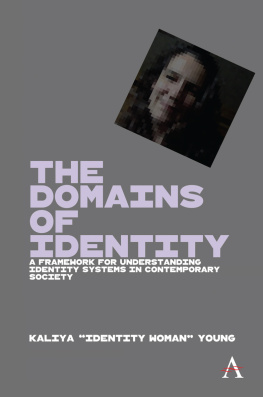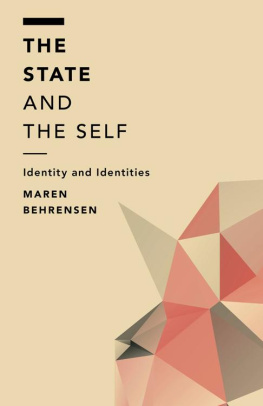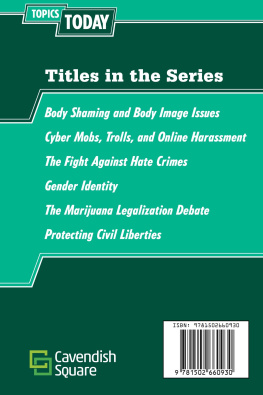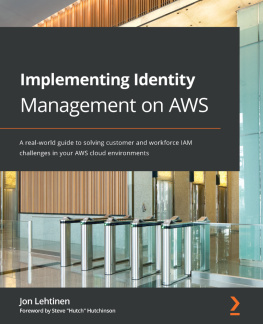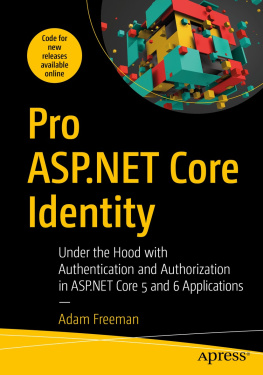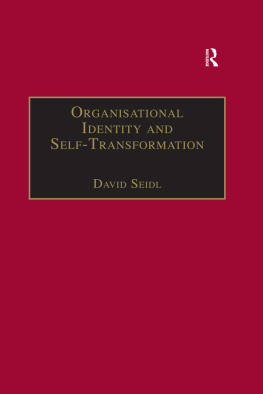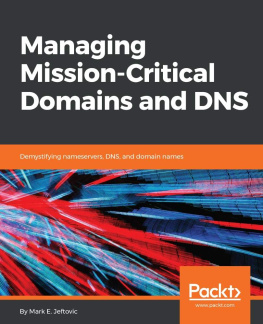The Domains of Identity
Series Introduction to Kaliya Youngs The Domains of Identity
As Lead Editors, we are excited to write this Introduction to the Anthem Press Ethics of Personal Data Collection Series. We are grateful to Acquisitions Editor Megan Greiving whose initial communication with Colette Mazzucelli inspired our cooperation after speaking with Publisher Tej P. S. Sood.
The series builds on an initial special issue of Genocide Studies and Prevention that Colette organized at the invitation of Professor Douglas S. Irvin-Erickson, School for Conflict Analysis and Resolution, George Mason University; and Yasemin Irwin-Erickson, with funding for a series of workshops at New York University provided by a grant from the Robert Bosch Foundation in Stuttgart, Germany. We are most grateful to Anda Ruf and Carolin Wattenberg at the Bosch Foundation for their helpful and timely assistance in Germany and to Executive Director Richelle Ash and Professor Elisabeth King, NYU Steinhardt, as well as Miss Yvonne (Ye) Wang, PRIISM New York University, for Steinhardts gracious hosting during one of the contributors workshops. Tina Lam and Nicolette Teta, MA in International Relations (MAIR) Program at New York University, were instrumental in providing the introduction to the NYU DC site for the closing Bosch Workshop, including this volumes author Kaliya Young.
Likewise, the dedicated participation of NYU graduate candidates is sincerely appreciated, notably Laura Salter, Danielle Marie Lucksted, Annika Squires, Nicole Scartozzi, and Jakub Wojciech Kibitlewski. Jakub is joining the series team as a graduate exchange student in the MAIR Conflict Resolution seminar taught by Colette from the John F. Kennedy Institute for North American Studies, Freie Universitt Berlin. We eagerly anticipate developing a partnership with Berlin institutions as the research in this series evolves and express our gratitude particularly to Senta Hoefer, Global Diplomacy Lab (GDL) and German Federal Foreign Office, for the forward-looking GDL initiatives related to our areas of interest.
This first volume in the series underlines an integral aspiration on the part of the editors and publisher alike: to advance the public discourse on the ethics of personal data, particularly its collection and dissemination. The omnipresent influence of big data, the rapid advances in technology, and the need to access personal data in increasingly remote locations to hold perpetrators of heinous crimes against humanity, including sexual violence in conflict, accountable, before local as well as international courts, resonate in the field experiences and academic research of different contributors to forthcoming volumes in the Series.
The rising concerns and incessant questions pertaining to the ethics of personal data speak to its evolution as a meta-rhino, which is defined by Michele Wucker as a structural issue that creates/worsens other challenges, for example, inequality, as expressed in her 2016 volume The Gray Rhino. Since the Cambridge Analytica scandal, it is abundantly clear, as Alexandra Samuel writes in a 2018 article for The Verge, that [s]ocial networks and other advertising platforms may set up various processes that nationally screen out data aggregators or manipulative advertisers, but as long as these companies run on advertising revenue, they have little incentive to promote transparency among data brokers and advertisers. And those industries, in turn, have little motivation to place ethics ahead of profit.
The need for a revolutionary approach to the ways in which citizens worldwide should be compensated for the use of their personal data by myriad institutions and multinationals is a cardinal rule in the public conversations this series aims to instigate.
Moreover, of fundamental ethical concern as this series evolves is surveillance capitalism, which Shoshana Zuboff analyzes in the context of an emerging system of domination by technology firms. The transformation of power by these firms and their experts, and the corresponding behavior modification that occurs in this context operating outside individual awareness and public accountability, as discussed by Princeton Professor Paul Starr in the November/December 2019 issue of Foreign Affairs, necessitates action and reflection to nurture personal and community engagement to uphold democracy.
By launching a partnership with the Bled Strategic Forum, participating in the Paris Peace Forum, and developing projects with colleagues within the BMW Foundation Herbert Quandt Responsible Leaders Network, the contributors to this series intend purposefully to exchange ideas and propose initiatives that speak to various themes introduced by Kaliya Young in her timely analysis.
More than 20 years in the making, The Domains of Identity is pioneering research to expand enterprising thought leadership in our Anthem Press series. Kaliya is a trailblazer in the codification of the industry that we term personal data, specifically, the understanding of identity across every fragment of our diversity. The longstanding dedication by James Felton Keith in his career to asking questions such as What is data? and the industrial space of personal data, in particular, make this book as much a historical reference as a seminal touchstone of what we consider to be evidence of the existence of our personhood.
The groundbreaking history of this book is embodied equally by its contents and creator. It is a pleasure to shed light on the influence that Kaliya Young has on transforming a genre of thought about the Internet, cyberspace, personhood, privacy, protection, capitalism, corporatization, publicization (a new word introduced into the vocabulary of the genre), and privatization of the evidence of our lives and the communities in which they exist.
The journey leading James to the space of data sovereignty and data value that started via The Data Union was preceded by the oldest digital asset trade association, the Personal Data Ecosystem Consortium, which was preceded by the Internet Identity Workshop. Born out of the dot-com era and propelled into the twenty-first century, these orgs were all mothered by Kaliya. In 2005, Kaliya was asked to build an online presence by Doc Searls when he founded Project VRM at the Harvard Berkman Klein Center for Internet & Society. She began her blog named Identity Woman and has become The Identity Woman, here a widely used Internet handle, to differentiate her from the others writing on topics of digital and non-digital data.
The Domains of Identity are as important to this time as our early laws of physics: how we understand our ability to move forward with the codification of our existence must be designed with the humans autonomy and choice first. Or man and womankind run the risk of automating everything that makes people human. This texts election is deliberate and hopeful: we did not know if Kaliya would agree to participate. James Jim Pasquale, a member of the series editorial board, deserves a special thank-you for making this work our lead volume citing Kaliyas lectures in 2010. His participation in a Bosch Fellowship AlumniNew York UniversityThe Data Union transnational dialogue organized during fall 2018 at Cultural Vistas in New York Citys historic Woolworth Building, including Zoom video communications with BMW Foundation Responsible Leader and Global Diplomacy Lab Alumna Elizabeth Maloba in Nairobi, allow us to reflect on the nature of this series and its evolution. In this context, our appreciation is expressed to Cultural Vistas President and Chief Executive Officer Jennifer Clinton, PhD, for her gracious assistance hosting our thought leadership events as a fellow member of the series editorial board.
Jim is an original cowboy of the data ecosystems and subject-matter expert at interoperability of data, leading with
Next page
